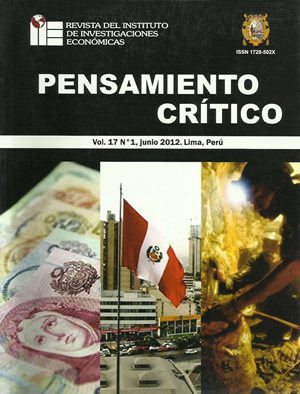La falacia de la estabilidad de precios
DOI:
https://doi.org/10.15381/pc.v17i1.8986Keywords:
market prices, state interference, economic calculation, fluctuation of market prices.Abstract
This article evaluates the fallacy of price stabilization, stability they crave the monetary authorities who wish to maintain the monopoly of the monetary base. Damage caused by government intervention in monetary affairs, and the harmful effects caused by those monetary policies that aim to: reduce interest rates and increased market activity through monetary expansion inorganic; made people want stabilization. It includes the development of this erroneous idea and the appeal it holds for people, if we consider the arbitrary suffered by the currency and credit. Market prices are historical facts, the result of a constellation of circumstances recorded, at one point, the irreversible historical process. In the economic field, the concept of measurement has little meaning. In the real world of constant change there is no points, objects, qualities or relations fixed to measure the changes occurred. The operation of economic calculation only needs a monetary system immune from state interference. When the BCR increases the amount of money to expand the purchasing power of government or temporarily lower the interest rate; disarticulate all relations disturb the monetary and economic calculation. The objective of a sound monetary policy is to prevent the ruling to induce inflation and credit expansion private banks. The idea of stabilizing the purchasing power of money was generated by the desire to create: a world immune to the incessant flow of people's things, a world alien to continuous historical process. Income perpetually designed to meet the needs of religious foundations or charities, are reflected in these fields. Later established monetary annuities. Donors and recipients is assumed that das income for a certain amount of money can not be affected by economic changes. However, such hopes were unsuccessful. Successive generations were able to see how they failed most carefully laid plans for the deceased entrepreneurs. Battered by the experience, people began to think about whether there would be some formula that would achieve such desired objectives. So, economists took to speculate on changes in the purchasing power of money, trying to find formulas that allow to eliminate these variations.Downloads
Published
Issue
Section
License
Copyright (c) 2012 Pablo Rivas Santos

This work is licensed under a Creative Commons Attribution-NonCommercial-ShareAlike 4.0 International License.
THE AUTHORS RETAIN THEIR RIGHTS:
a. The authors retain their trademark and patent rights, and also on any process or procedure described in the article.
b. The authors retain the right to share, copy, distribute, execute and publicly communicate the article published in Pensamiento Crítico (for example, place it in an institutional repository or publish it in a book), with recognition of its initial publication in Pensamiento Crítico.
c. The authors retain the right to make a subsequent publication of their work, to use the article or any part of it (for example: a compilation of their works, notes for conferences, thesis, or for a book), provided they indicate the source of publication (authors of the work, journal, volume, number and date).






